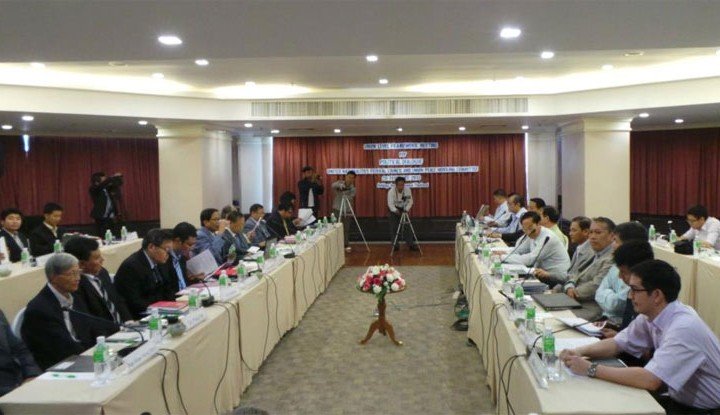The Myanmar government has announced that a long awaited all-inclusive ethnic conference will take place shortly, according to ethnic minority sources. It remains unclear, however, how ‘all-inclusive’ it will be and who will attend.

The intended conference was announced not long after a draft ‘Comprehenisve Union Peace and Ceasfire Agreement’ was presented on May 13 to the Myanmar Peace Centre for deliberation by a group comprising: Padoh Kwe Htoo Win (KNU) ; Sai La and Sai Ngeun (Restoration Council of Shan State (RCSS/SSA); Harn Yawnghwe, director of Brussels-based Euro Burma Office (EBO); and Hkun Htun Oo, leader of the Shan Nationalities League for Democracy (SNLD), according to the Shan Herald Agency for News.
The agreement was the result of a number of meetings held by the Working Group for Ethnic Coordination (WGEC) which is financed and supported by the Euro-Burma Office. The WGEC originally included members of the United Nationalities Federal Council (UNFC), but, due to the fact that the agreement had finally been agreed to, the UNFC dissolved its relationship with them.
The agreement—which is likely to be amended and is dated April 8, 2013—contains a number of points:
A 15-point common principles (including Panglong-style Agreement, non-secession and inclusivity)
2. A 14-point nationwide ceasefire accord (including establishment of Military Code of Conduct, Joint Ceasefire Committee and liaison offices)
3. A 6-point framework agreement for political dialogue (including setting up of a joint National Dialogue Steering Committee and the holding of National Dialogue Conference)
4. A 9-point transitional arrangement (including time frame, empowerment of vulnerable groups and land reform issues)
5. Scope of participation (900 participants from government, political parties and ethnic armed movements)
6. A 9-point dialogue (including constitutional reforms, security reforms, land issues, drug eradication, IDP/refugee issues, language and cultural nights and media issues)
7. Military Code of Conduct (as drafted by the Karen National Union)
While the agreement is the most comprehensive yet and, it is hoped, will form the basis for the all-inclusive dialogue, a number of issues still remain to be addressed. The military code of conduct was discussed by the KNU at an informal meeting with the government and military officials on June 15. While initial indications in relation to its acceptance are positive, the document still needs to be revised and approved by both parties. Many of the other armed ethnic groups have failed to produce Codes of Conduct and it remains unclear if the KNU Code of Conduct can be adapted for all armed ethnic groups.
In addition, the position of the UNFC also remains uncertain. While most members of the UNFC were involved in the drafting of the Framework Agreement the group also seeks separate dialogue as an individual representative of the majority of armed ethnic groups. A number of UNFC leaders have also expressed concerns in regard to its relationship with the WGECand the Myanmar Peace Centre, and some groups feel, due to their size, that they will not be given equal treatment.
Notwithstanding such concerns, many of the groups see the anouncement as a positive move on behalf of the the government, and while there still remains a number of issues to be addressed it is hoped that the framework agreement, and the dialogue can bring the country closer to a substantial peace.


